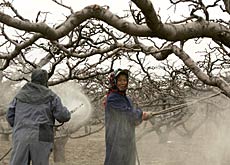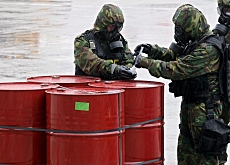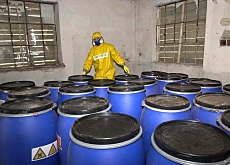Swiss stress governance at environment forum

The Swiss will be pressing for better governance at a meeting of environment ministers in Dubai on Tuesday, says Franz Perrez of the Federal Environment Office.
Perrez, head of global affairs at the office, said the Swiss particularly wanted to see more coherence in the way the environment is managed on a global level.
The Dubai meeting is the largest ever gathering of environment ministers, and will discuss, among other things, how best to deliver sustainable energy and more environmentally friendly tourism.
Almost 130 environment ministers are expected to attend the 9th Special Session of the United Nations Environment Programme’s (UNEP) Governing Council/Global Ministerial Environment Forum.
As the ministers arrived on Sunday, officials were wrapping up talks on a proposed global treaty on handling hazardous chemicals. The accord – expected to be signed at the ministers’ meeting – comes at a time when the production of such chemicals is moving increasingly from wealthy countries to poorer ones.
Ministers will also discuss soaring fuel prices and demand, and how environmental damage is threatening growth, especially in fast-developing countries such as China and India.
swissinfo: Environment minister Moritz Leuenberger opens the Global Ministerial Environment Forum on Tuesday. What do you expect he will say?
Franz Perrez: I think he will have three main messages. The first will relate to the responsibility that we all have with regard to the protection of the environment and that this is common to all nations.
He will also talk about strengthening international environmental governance. I expect him to say that in order to address the challenge of global environmental protection we need strong institutions – and therefore UNEP needs to be strengthened further as a central pillar of the global environmental regime.
Thirdly I expect him to say that we also need goals – a clear list of goals with criteria outlining environmental priorities for the future.
swissinfo: What are the main challenges facing the delegations?
F.P.: This conference will focus on issues. I think the most important relates to the chemicals area. Prior to the main forum there was the International Conference on Chemicals Management at which the Strategic Approach to International Chemicals Management (SAICM) will be adopted.
A second cluster of issues will deal with the contribution to the UN commission on sustainable development.
Ministers will also discuss strengthening international environmental governance – many efforts have been undertaken to further strengthen the international regime, most recently at the UN general assembly in September 2005 in New York.
swissinfo: What will be the main Swiss demands and targets at the conference?
F.P.: We think UNEP should directly contribute to furthering the coherence and synergy in the global environmental regime, namely in the chemicals and waste class.
We have a unique situation in which the three most important conventions dealing with hazardous waste and chemicals – the Rotterdam PIC Convention, the Stockholm POP Convention and the Basel Convention – have their secretariats in Geneva. We think a future secretariat structure should be integrated so that one secretariat with one head oversees all three conventions.
swissinfo: Is anything concrete likely to result from the conference or is it just a talking shop?
F.P.: Well, first of all talking shops are nothing bad because we need to talk together to take common positions, but UNEP is more than just a talking shop – of course exchanging experience and discussing problems will be an important part but we will also take positions.
In the past, UNEP has been crucial in developing chemical policy conventions, now it is crucial that we take the right decisions to make the SAICM work.
swissinfo-interview: Thomas Stephens
The 9th Special Session of the UNEP’s Governing Council/Global Ministerial Environment Forum takes place from February 7-9, 2006.
The forum will be attended by almost 130 environment ministers and 160 countries.
The International Conference on Chemicals Management took place February 4-6, 2006.
Over the next 15 years, the volume of chemicals produced is expected to increase by 85%, with 1,500 new chemicals produced each year, according to the UN.
The three most important conventions dealing with hazardous waste and chemicals have their secretariats in Geneva.
The Rotterdam Convention, in force since 2004, covers the international trade of certain hazardous chemicals. It stipulates that the export of the most dangerous pesticides and chemicals can only be authorised with the “prior informed consent” (PIC) of the receiving country.
The Stockholm Convention aims to introduce a worldwide ban on the production and use of Persistent Organic Pollutants (POPs), which are harmful chemicals in the environment that build up through the food chain.
The Basel Convention on the Control of Transboundary Movements of Hazardous Wastes and their Disposal is a comprehensive global environmental agreement on hazardous and other wastes.

In compliance with the JTI standards
More: SWI swissinfo.ch certified by the Journalism Trust Initiative



You can find an overview of ongoing debates with our journalists here . Please join us!
If you want to start a conversation about a topic raised in this article or want to report factual errors, email us at english@swissinfo.ch.